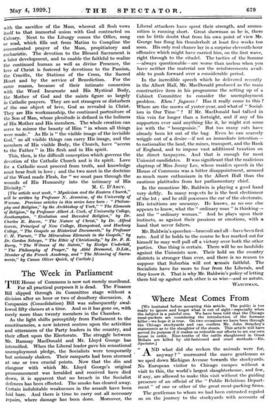The Week in Parliament T HE House of Commons is now
not merely moribund. For all practical purposes it is dead. The Finance Bill slipped through its Committee stage without a division after an hour or two of desultory discussion. A Companies (Consolidation) Bill was subsequently swal- lowed fifty clauses at a time. And so it has gone on, with rarely more than twenty members in the Chamber.
As the light shifts perceptibly from Parliament to the constituencies, a new interest centres upon the activities and utterances of the Party leaders in the country, and their effect upon the Electorate. The struggle between Mr. Ramsay MacDonald and Mr. Lloyd George has intensified. When the Liberal leader gave his sensational unemployment pledge, the Socialists were temporarily but seriously shaken. Their ramparts had been stormed at one or two crucial points. Now that the din and clangour with which Mr. Lloyd George's original pronouncement was heralded and received have died down, it is apparent that no breach in the Socialist defences has been effected. The smoke has cleared away. Certain indubitable weaknesses in the assault have been laid bare. And there is time to carry out all necessary repairs, where damage has been done. Moreover, the • Liberal attackers have spent their strength, and ammu- nition is running short. Great showman as he is, there can be little doubt that from his own point of view Mr. George has flung his thunderbolt at least five weeks too soon. His only real chance lay in a surprise eleventh-hour offensive which might have carried him, on the first wave, right through to the citadel. The tactics of the Somme —always questionable—are worse than useless when you have neither the material nor the reinforcements avail- able to push forward over a considerable period.
In the incredible speech which he delivered recently in the Albert Hall, Mr. MacDonald produced as the main constructive item in his programme the setting up of a Cabinet Committee to consider the unemployment problem. Eheu ! fugaees ! Has it really come to this ? Where are the snows of yester-year, and what of " Social- ism in Our Time " ? If Mr. MacDonald had talked in this vein for longer than a fortnight, and if any of his supporters ever said anything like it, he might cut some ice with the " bourgeoisie." But too many cats have already been let out of the bag. Even he can scarcely wriggle out of a desire—if not an immediate intention— to nationalize the land, the mines, transport, and the Bank of England, and to impose vast additional taxation on the direct taxpayers. And that is enough for most Unionist candidates. It was significant that the malicious claptrap of Miss Jenny Lee, whose maiden speech in the House of Commons was a bitter disappointment, aroused so much more enthusiasm in the Albert Hall than the cautious platitudes from her parliamentary chief.
In the meantime Mr. Baldwin is playing a good hand very deftly. In many respacts he is the best electioneer of the lot ; and he still possesses the ear of the electorate. His intuitions are uncanny. He knows, as no one else appears to know, what the " ordinary man " is thinking—. and the " ordinary woman." And he plays upon their instincts, as against their passions or emotions, with a hand that never falters.
Mr. Baldwin's speeches—broccoli and all—have been first rate. And if he holds to the course he has marked out for himself he may well pull off a victory over both the other parties. One thing is certain. There will be no landslide against the Unionists now. Their hold on the country districts is stronger than ever, and there is no reason to suppose that Suburbia will not *emain faithful. The Socialists have far more to fear from the Liberals, and they know it. That is why Mr. Baldwin's policy of letting them bid up against each other is so wise—and so astute.
WATCHMAN.






















































 Previous page
Previous page